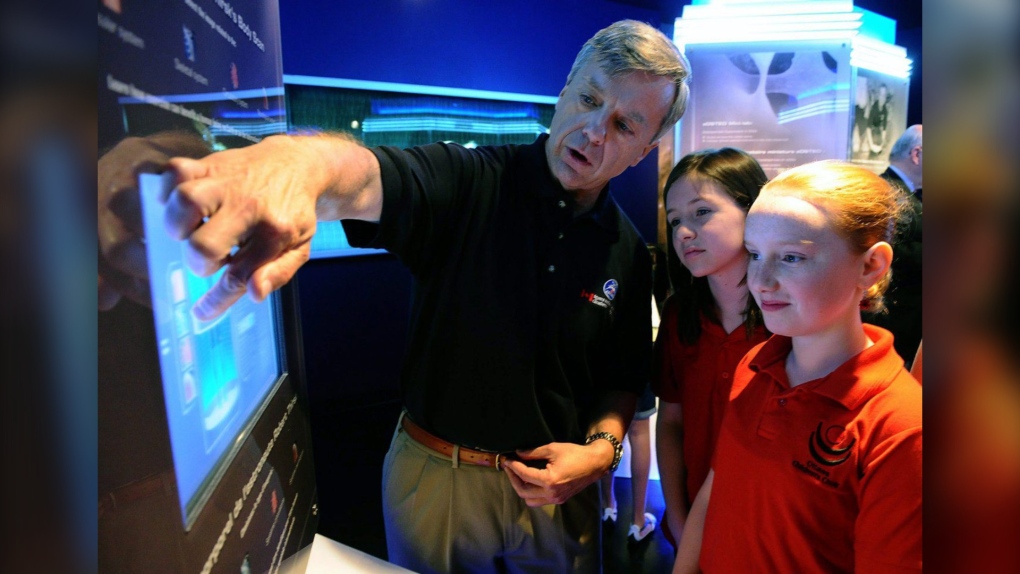'Permanent bone loss': Calgary study finds astronauts suffer on return to Earth
 FILE - Canadian astronaut Robert Thirsk talks with students from Rockcliffe Elementary School as they get a first look at The Living In Space exhibit during its unveiling at the Canadian Aviation and Space Museum in Ottawa on Thursday, May 12, 2011. (THE CANADIAN PRESS/Sean Kilpatrick)
FILE - Canadian astronaut Robert Thirsk talks with students from Rockcliffe Elementary School as they get a first look at The Living In Space exhibit during its unveiling at the Canadian Aviation and Space Museum in Ottawa on Thursday, May 12, 2011. (THE CANADIAN PRESS/Sean Kilpatrick)
The experience may be out-of-this-world but research indicates those who travel to outer space suffer from increased bone loss.
A study released Thursday from the Cumming School of Medicine at the University of Calgary followed 17 astronauts before and after their space flights.
The TBone study, conducted over a seven-year period starting in 2015, found that prolonged weightlessness accelerated bone loss in the astronauts.
"We found that weight-bearing bones only partially recovered in most astronauts one year after spaceflight," said Dr. Leigh Gabel, an assistant professor in the faculty of kinesiology and lead author of the study.
"This suggests the permanent bone loss due to spaceflight is about the same as a decade worth of age-related bone loss on Earth."
The researchers travelled to Johnson Space Center in Houston to scan the wrists and ankles of the astronauts before they left for space, on their return to Earth then after six months and one year.
The findings, published in Scientific Reports, said the loss happens because bones that would normally be weight-bearing on Earth, such as the legs, don't have to carry weight in a zero gravity setting.
"We've seen astronauts who had trouble walking due to weakness and lack of balance after returning from spaceflight to others who cheerfully rode their bike on Johnson Space Center campus to meet us for a study visit," said Dr. Steven Boyd, director of the McCaig Institute for Bone and Joint Health and professor in the Cumming School of Medicine.
"There is quite a variety of response among astronauts when they return to Earth."
The study found some astronauts who flew on shorter missions, under six months, recovered bone strength and density in the lower body compared to those who flew for longer durations.
As future space missions are exploring travel to more distant locations, the study's next iteration plans to look at the effects of even longer trips, to support astronauts who may one day travel beyond the International Space Station.
The University of Calgary's former chancellor and astronaut, Robert Thirsk, said he knows how difficult it can be to be back on solid ground.
"Just as the body must adapt to spaceflight at the start of a mission, it must also readapt back to Earth's gravity field at the end," he said.
"Fatigue, light-headedness and imbalance were immediate challenges for me on my return. Bones and muscles take the longest to recover following spaceflight. But within a day of landing, I felt comfortable again as an Earthling."
The study was funded by the Canadian Space Agency in partnership with the European Space Agency, NASA and astronauts from North America, Europe, and Asia.
This report by The Canadian Press was first published June 30, 2022.
CTVNews.ca Top Stories

From outer space? Sask. farmers baffled after discovering strange wreckage in field
A family of fifth generation farmers from Ituna, Sask. are trying to find answers after discovering several strange objects lying on their land.
Broadcaster and commentator Rex Murphy dead at 77: National Post
The National Post is reporting that Rex Murphy, the pundit and columnist who hosted a national call-in radio show for decades, has died.
Pearson gold heist suspect arrested after flying into Toronto from India
Another suspect is in custody in connection with the gold heist at Toronto Pearson International Airport last year, police say.
Millions of cyberattacks per hour as B.C. government investigates multiple breaches
Careful attention to government statements and legislation is required to get a handle on the level of risk British Columbians’ information is under, as investigators probe multiple breaches under a continued barrage of attacks.
Ontario family receives massive hospital bill as part of LTC law, refuses to pay
A southwestern Ontario woman has received an $8,400 bill from a hospital in Windsor, Ont., after she refused to put her mother in a nursing home she hated -- and she says she has no intention of paying it.
Debate on abortion rights erupts on Parliament Hill, Poilievre vows he won't legislate
A Conservative government led by Pierre Poilievre would not legislate on, nor use the notwithstanding clause, on abortion, his office says, as anti-abortion protesters gather on Parliament Hill.
Justin and Hailey Bieber are expecting their first child together
Hailey and Justin Bieber are going to be parents. The couple announced the news on Thursday on Instagram, both sharing a video that showcases Hailey Bieber's growing belly.
Here are the ultraprocessed foods you most need to avoid, according to a 30-year study
Studies have shown that ultraprocessed foods can have a detrimental impact on health. But 30 years of research show they don’t all have the same impact.
New 'Lord of the Rings' film coming in 2026
The Oscar-winning team behind the nearly US$6 billion blockbuster 'Lord of the Rings' and 'The Hobbit' trilogies is reuniting to produce two new films.

































